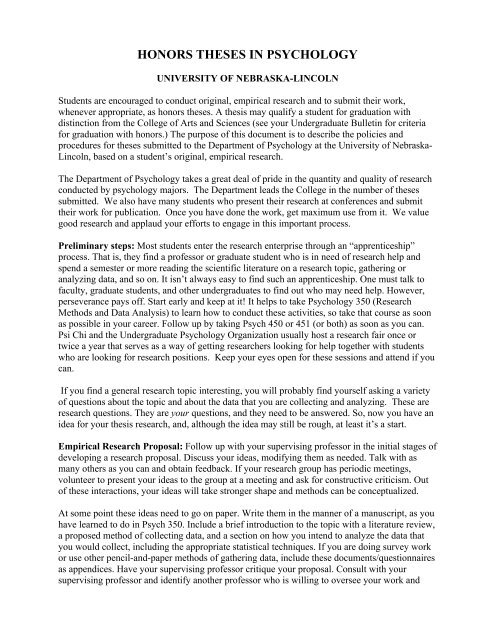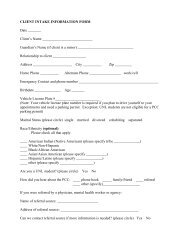Honors Thesis Instructions - Psychology - The University of ...
Honors Thesis Instructions - Psychology - The University of ...
Honors Thesis Instructions - Psychology - The University of ...
Create successful ePaper yourself
Turn your PDF publications into a flip-book with our unique Google optimized e-Paper software.
HONORS THESES IN PSYCHOLOGY<br />
UNIVERSITY OF NEBRASKA-LINCOLN<br />
Students are encouraged to conduct original, empirical research and to submit their work,<br />
whenever appropriate, as honors theses. A thesis may qualify a student for graduation with<br />
distinction from the College <strong>of</strong> Arts and Sciences (see your Undergraduate Bulletin for criteria<br />
for graduation with honors.) <strong>The</strong> purpose <strong>of</strong> this document is to describe the policies and<br />
procedures for theses submitted to the Department <strong>of</strong> <strong>Psychology</strong> at the <strong>University</strong> <strong>of</strong> Nebraska-<br />
Lincoln, based on a student’s original, empirical research.<br />
<strong>The</strong> Department <strong>of</strong> <strong>Psychology</strong> takes a great deal <strong>of</strong> pride in the quantity and quality <strong>of</strong> research<br />
conducted by psychology majors. <strong>The</strong> Department leads the College in the number <strong>of</strong> theses<br />
submitted. We also have many students who present their research at conferences and submit<br />
their work for publication. Once you have done the work, get maximum use from it. We value<br />
good research and applaud your efforts to engage in this important process.<br />
Preliminary steps: Most students enter the research enterprise through an “apprenticeship”<br />
process. That is, they find a pr<strong>of</strong>essor or graduate student who is in need <strong>of</strong> research help and<br />
spend a semester or more reading the scientific literature on a research topic, gathering or<br />
analyzing data, and so on. It isn’t always easy to find such an apprenticeship. One must talk to<br />
faculty, graduate students, and other undergraduates to find out who may need help. However,<br />
perseverance pays <strong>of</strong>f. Start early and keep at it! It helps to take <strong>Psychology</strong> 350 (Research<br />
Methods and Data Analysis) to learn how to conduct these activities, so take that course as soon<br />
as possible in your career. Follow up by taking Psych 450 or 451 (or both) as soon as you can.<br />
Psi Chi and the Undergraduate <strong>Psychology</strong> Organization usually host a research fair once or<br />
twice a year that serves as a way <strong>of</strong> getting researchers looking for help together with students<br />
who are looking for research positions. Keep your eyes open for these sessions and attend if you<br />
can.<br />
If you find a general research topic interesting, you will probably find yourself asking a variety<br />
<strong>of</strong> questions about the topic and about the data that you are collecting and analyzing. <strong>The</strong>se are<br />
research questions. <strong>The</strong>y are your questions, and they need to be answered. So, now you have an<br />
idea for your thesis research, and, although the idea may still be rough, at least it’s a start.<br />
Empirical Research Proposal: Follow up with your supervising pr<strong>of</strong>essor in the initial stages <strong>of</strong><br />
developing a research proposal. Discuss your ideas, modifying them as needed. Talk with as<br />
many others as you can and obtain feedback. If your research group has periodic meetings,<br />
volunteer to present your ideas to the group at a meeting and ask for constructive criticism. Out<br />
<strong>of</strong> these interactions, your ideas will take stronger shape and methods can be conceptualized.<br />
At some point these ideas need to go on paper. Write them in the manner <strong>of</strong> a manuscript, as you<br />
have learned to do in Psych 350. Include a brief introduction to the topic with a literature review,<br />
a proposed method <strong>of</strong> collecting data, and a section on how you intend to analyze the data that<br />
you would collect, including the appropriate statistical techniques. If you are doing survey work<br />
or use other pencil-and-paper methods <strong>of</strong> gathering data, include these documents/questionnaires<br />
as appendices. Have your supervising pr<strong>of</strong>essor critique your proposal. Consult with your<br />
supervising pr<strong>of</strong>essor and identify another pr<strong>of</strong>essor who is willing to oversee your work and
approve your proposal. When the proposal is ready, make a copy and submit it, along with the<br />
<strong><strong>The</strong>sis</strong> Prospectus form, to the Chair <strong>of</strong> the Department’s Undergraduate Issues Committee<br />
(UIC). Only one copy <strong>of</strong> the prospectus is needed. Although you may need to submit an<br />
application to the Institutional Review Board (IRB) or to the Institutional Animal Care and Use<br />
Committee (IACUC) before you can begin your work, the UIC does not require seeing IRB or<br />
IACUC approval in order to review your prospectus. If your prospectus is approved by the UIC<br />
but then you need to make significant changes to your work based on IRB or IACUC feedback,<br />
you may need to resubmit your prospectus to the UIC.<br />
<strong>The</strong> Department <strong>of</strong>fice, 238 Burnett, can give you the name <strong>of</strong> the current Chair <strong>of</strong> the UIC. <strong>The</strong><br />
<strong><strong>The</strong>sis</strong> Prospectus form can be obtained from the College <strong>of</strong> Arts and Sciences Advising Center<br />
on the first floor <strong>of</strong> Oldfather Hall.<br />
<strong>The</strong> UIC is charged by the <strong>Psychology</strong> Department with establishing and maintaining standards<br />
for theses. <strong>The</strong> Department has a long-standing tradition <strong>of</strong> accepting only empirical research<br />
reports as theses. That is, data must be collected, analyzed, and interpreted. A thesis that<br />
involves only a review <strong>of</strong> the literature is not acceptable as a thesis for distinction in <strong>Psychology</strong>,<br />
although some other departments allow them. In some cases the data may have been collected<br />
by someone other than the student, but in all cases the student must undertake its analysis. <strong>The</strong><br />
research may involve true experiments, correlational analyses, or data description (quantitative<br />
or qualitative), or any combination <strong>of</strong> these approaches. Your supervising pr<strong>of</strong>essors will have a<br />
good idea about what is acceptable as a thesis proposal, so follow their advice. Aside from the<br />
requirement that the thesis be empirical, there are no set guidelines for how extensive the<br />
research must be. However, the UIC will not accept what it judges to be perfunctory research<br />
(e.g., projects that employ so few subjects or measures that it is unlikely that meaningful results<br />
could be achieved regardless <strong>of</strong> the nature <strong>of</strong> the data).<br />
Proposals should be submitted by the end <strong>of</strong> the semester before the semester <strong>of</strong> graduation. Be<br />
aware that the UIC may be slow in performing its duties if your proposal comes in during the<br />
summer or at especially busy times during the regular semesters. <strong>The</strong> UIC will notify you in<br />
writing <strong>of</strong> the status <strong>of</strong> your proposal.<br />
Academic credit: Students are not required to sign up for academic credit for a senior thesis or<br />
honors thesis research, but Psych 399H or 499 are available for one or more semesters for those<br />
who wish to receive credit. Arrangements should be made with your supervising pr<strong>of</strong>essor.<br />
Post-proposal procedures: Once your proposal has been accepted by the Undergraduate Issues<br />
Committee and you have all the necessary permissions from the IRB and the Department’s<br />
Ethics Committee, you may begin your research. This will culminate in the written manuscript,<br />
which constitutes your thesis.<br />
<strong>The</strong> thesis: Your thesis should be written in any science journal format (such as APA) that your<br />
Supervisory Committee specifies. <strong>The</strong> thesis can be written as though you are planning to submit<br />
it to a journal for publication. Generally, this means that the introduction should be a more<br />
extensive “literature review” than is typically found in the proposal. However, it should contain a<br />
tightly focused discussion <strong>of</strong> the rationale for your particular project. Generally speaking,<br />
following the format taught in Psych 350 will be fine. <strong>The</strong> thesis should also contain a detailed<br />
methods section, results section, and discussion <strong>of</strong> your results. Write and revise your thesis<br />
based on comments from your supervisory committee.
<strong>The</strong> examination: Schedule a time (at least one hour) to meet with your Supervisory Committee<br />
for your final examination. <strong>The</strong> Supervisory Committee members will ask questions about your<br />
thesis research, including data analytic techniques and the relation <strong>of</strong> your findings to data or<br />
theory in your field. <strong>The</strong>y may ask other questions as well. At the conclusion <strong>of</strong> the exam, the<br />
Committee will ask you to leave the room while they evaluate your performance. <strong>The</strong> Committee<br />
will then tell you their decision (which is generally positive!) regarding the exam and thesis.<br />
Don’t be surprised if they want you to revise the thesis in some way. <strong>The</strong> committee members<br />
will be asked to fill out and sign two reports that are included with the <strong><strong>The</strong>sis</strong> Prospectus Form.<br />
One report concerns the thesis itself and the other report deals with the examination.<br />
<strong>The</strong>se reports need to be submitted to the Chair <strong>of</strong> the UIC along with TWO copies <strong>of</strong> the final<br />
draft <strong>of</strong> the thesis. Provided that the work you submit was the same as the work you originally<br />
proposed, the UIC will sign <strong>of</strong>f on the thesis and submit it to the College, which ultimately<br />
makes the final decision regarding graduation with distinction. One copy <strong>of</strong> the thesis will be<br />
retained in the Department.<br />
Timing: As you have probably gathered, this process takes time. <strong>The</strong> thesis must be submitted to<br />
the UIC about a week before the thesis deadlines announced in the Undergraduate Bulletin and<br />
on the College information sheet “Degrees with Distinction in the College <strong>of</strong> Arts and Sciences.”<br />
<strong>The</strong> UIC chair will quickly review your package to make sure everything is complete, and will<br />
hand deliver your package to the College on the deadline date. Allow yourself plenty <strong>of</strong> lead<br />
time in scheduling your exam so that you can make any revisions and get it to the UIC Chair in<br />
time. <strong>The</strong> following is a rough timetable for a student planning to graduate in May <strong>of</strong> 2007:<br />
Jan 2006: Discuss you ideas with your primary pr<strong>of</strong>essor, reading the literature and<br />
beginning to write the proposal.<br />
Mar 2006: Meet with your two supervising pr<strong>of</strong>essors, finalize you proposal and send a<br />
copy to the UIC.<br />
Apr 2006: Complete the IRB and IACUC forms and submit the approval package to the<br />
Department’s Ethics Committee. If using the humans subjects pool, complete the necessary<br />
paperwork.<br />
Summer 2006: Make final preparations for gathering data.<br />
Fall 2006: Gather data, conduct statistical analyses, and write one or more drafts <strong>of</strong> your<br />
thesis.<br />
Dec. 2006: Submit your draft thesis to your primary supervising pr<strong>of</strong>essor (although<br />
called a “draft,” make it as close to a final copy as you can).<br />
Jan. 2006: Make revisions on your thesis based on comments from your supervisor, and,<br />
once approved, give the thesis to your secondary supervisor.<br />
Feb. 2006: Schedule the final oral exam. Revise the thesis one more time, and submit it<br />
along with the Examination Report to the Department’s Chair <strong>of</strong> the UIC.



